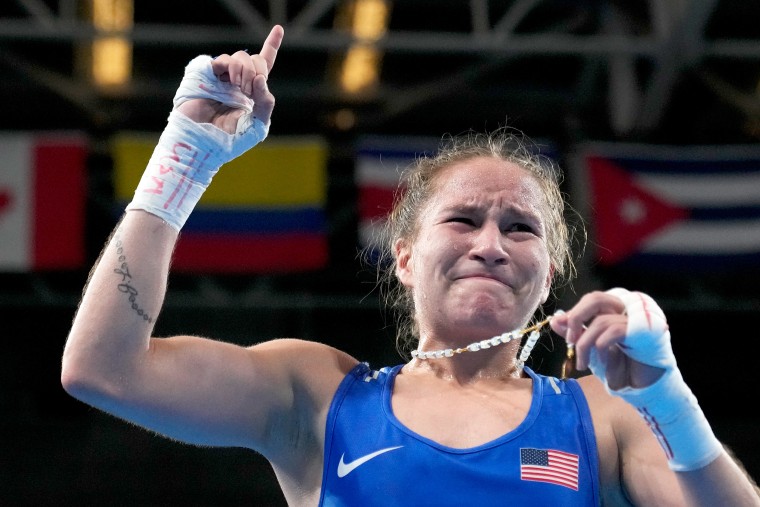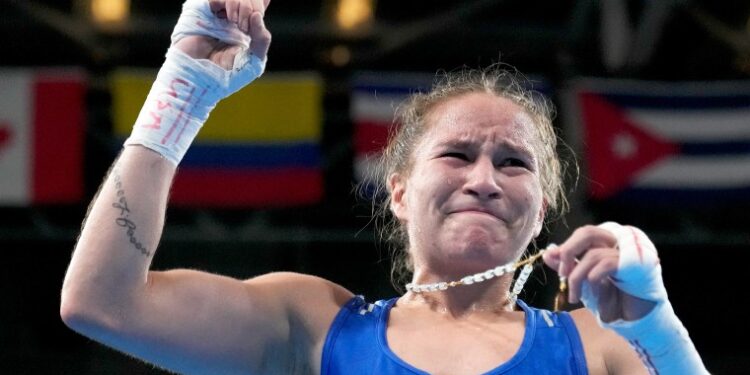U.S. boxer Jennifer Lozano started thinking about how far the sport could take her at 9 years old in Laredo, Texas. When she secured her spot in the 2024 Paris Olympics at October’s Pan American Games, she finally realized a dream years in the making.
“That was surreal. I just couldn’t believe what was right in my hand,” she told NBC News. “Something I was working so hard for. Something I had dreamt of for so long for years since I was a kid and everything I had to go through just to be here.”
But getting to this point wasn’t easy. Lozano was often teased in school for her weight and her Spanish accent, even though she lived in a city where about 90% of the population speaks Spanish at home. When she sought advice about how to handle bullying, she turned to the person she trusted the most: her grandmother.
“She just told me, ‘Sweetheart, if someone ever hits you, you hit them back. Don’t allow it,’” Lozano said on NBC’s “My New Favorite Olympian” podcast. “I was like, ‘You’re right.’”
Taking her grandmother’s advice, Lozano joined her local boxing gym.
“I went and I loved it,” she said. “I fell in love with it. It was super hot there. But I loved the fact that even shadow boxing, even knowing the basic things without actually hitting a person … [it] gave me so much confidence as a kid. Like, ‘Damn, I know how to fight.”
Often she was the only female fighter in the gym. But she embraced her new sanctum.
“It got to a point where the guys didn’t want to fight me anymore because I would leave them bleeding,” Lozano said. “I’d hit them too much, or they just didn’t want to get beat up by a girl. So they got mad. They got so angry.”
Lozano developed an edge in the ring with her persistent work ethic. After just one month of training, she was invited to join her gym’s competition team. And it didn’t take long for her to start making a name for herself in boxing by winning titles.
Within two years, Lozano became recognized in national boxing competitions. In 2015 and 2016, she won the National Junior Olympics. And in 2018 and 2019, she won the National Golden Gloves Championships. Her fierce fighting style even produced a nickname given by her grandmother.
“She called me ‘La Traviesa,’” or “troublemaker,” Lozano said. “I was causing chaos, mayhem.”
But a profound moment occurred in August 2019 when Lozano lost one of her biggest supporters. After she was unable to contact her grandmother for days, Lozano personally discovered she had passed away from a heart attack when she visited her home.
“I remember looking at her, and I don’t know why I had this urge, but I ended up just slightly flipping her over,” she said. “So I flipped her back, and I guess that’s the last confirmation. My body, my conscience, needed to confirm. That’s when I just started screaming.”
Following her grandmother’s death, Lozano’s coaches encouraged her to postpone her next fight. But Lozano remained committed to honoring her memory.
“I promised my grandma I was going to fight,” she said.
And although she won, her triumph gave way to grief.
She said she started “getting angry … and not for the right reasons.”
“It just took over me completely. I became completely blinded, and I’d make people hate me because I didn’t like myself,” she said. “I want to be alone. And so from then on, I started seeking help, because I was like, ‘OK, let me get into therapy.’”

Seven months after her grandma’s death, the grief was still there, but Lozano finally felt peace. And her calmness showed in the ring. Lozano would win the USA Boxing Elite National Championships for three consecutive years starting in 2020.
Now she’s looking to carry her troublemaker nickname into the ring in Paris, where she is representing not only the U.S. but also her hometown in Texas.
“It gives me chills, because it’s crazy,” she said. “I made it. Every single ounce of literal blood, sweat and tears, every sacrifice, everything I’ve been through in my life, they were all worth it.”
And with the Paris Games just approaching, Lozano has thought about the significance of being an Olympian for the first time.
“It feels so good to be able to represent not just the U.S. itself, but also Mexico and Latinas,” she said. “And just to be the biggest step towards Mexican American, Latinas and Latinos, that anything is possible. That no matter what trauma you went through, what obstacle, how hard life took you, done it, dragged you by the hair, by the feet, anything that you can if you really wanted it that bad, if you really want to make a change, if you’re truly dedicated, disciplined, you want to be the change for you and others.”






